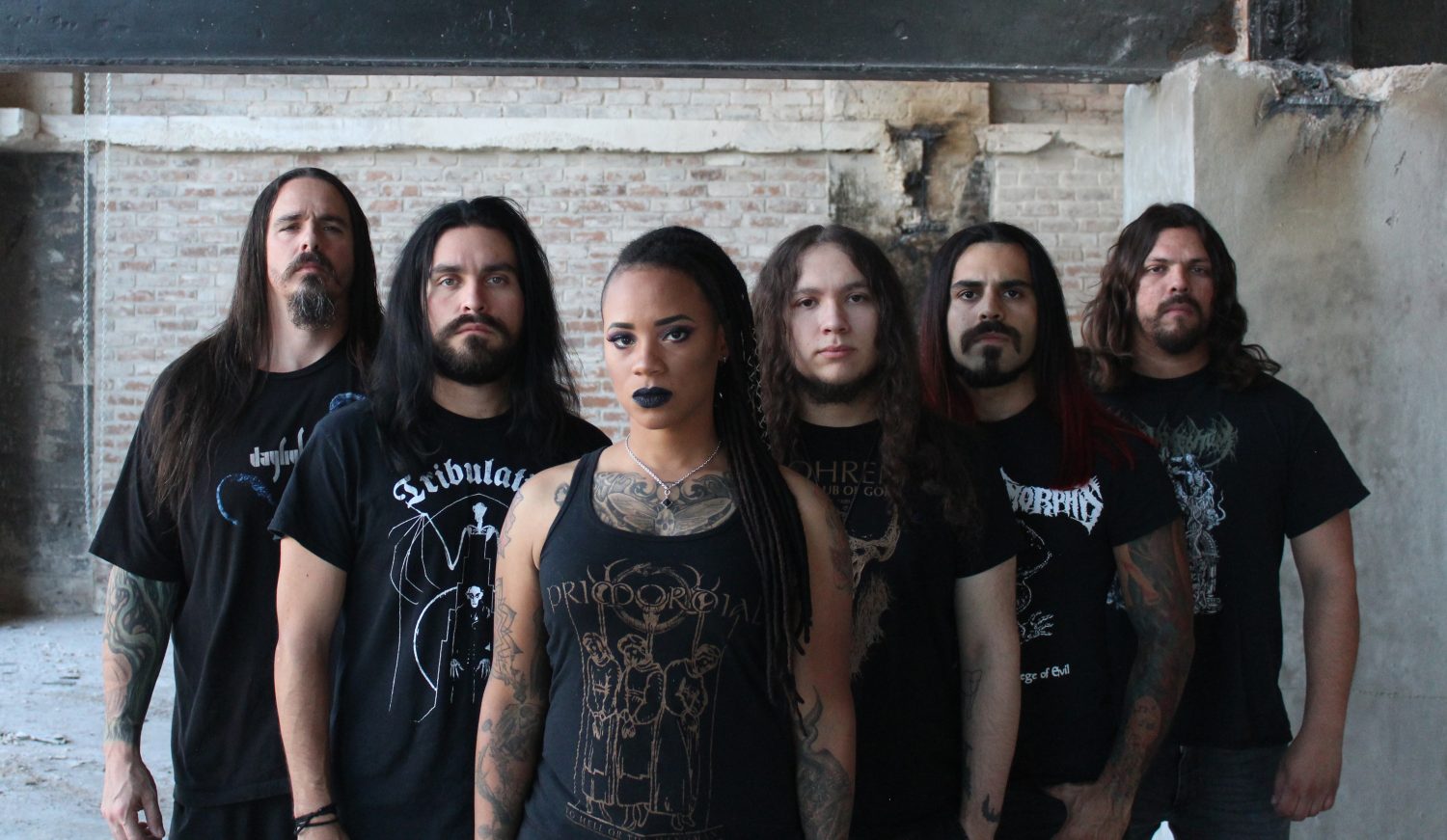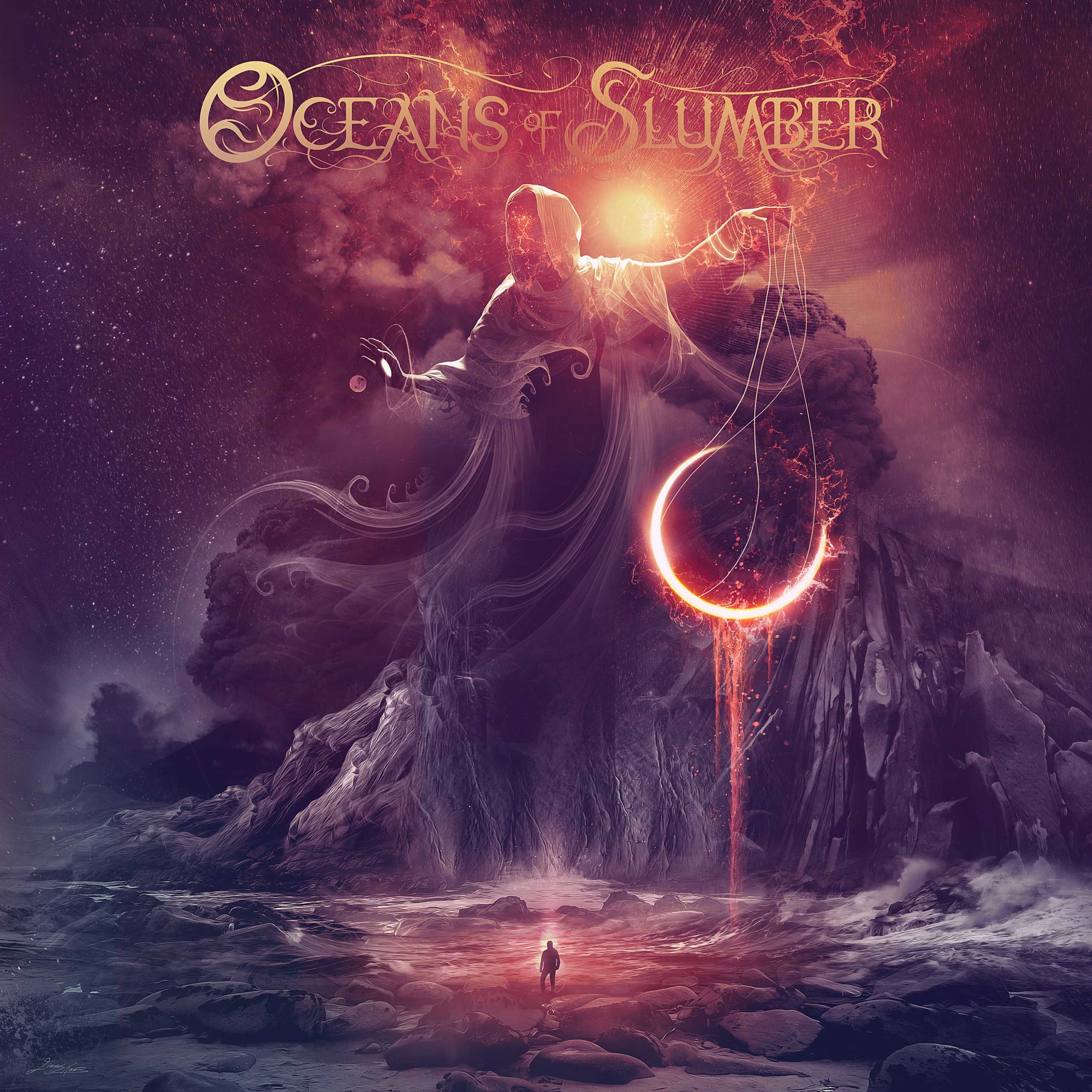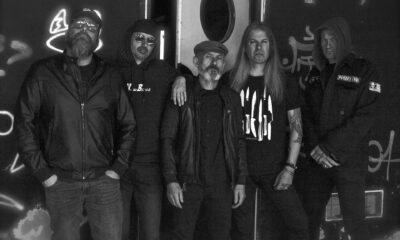Interviews
In Conversation with Oceans of Slumber: Dobber Beverly on Influences, Instrumentals and Inspirations (Part 2)

With the recent release of their fourth, self-titled, album, Texan sextet Oceans of Slumber fire off 70-plus minutes of stunningly crafted, emotional progressive metal that moves between its multitude of hooks (amplified by Cammie Gilbert’s exceptional singing voice), blistering death metal and emotive doom without ever outstaying its welcome. In Part 1 of the interview, principal songwriter and drummer Dobber Beverly caught up with V13 to discuss the new album, the emotional connection between the band and their fans, as well as the reality of unacceptable gender stereotypes within the metal world. For Part 2, I wanted to delve deeper into the mind of an accomplished songwriter and to look at both musical and non-musical influences, as well as certain recurring elements that have appeared throughout the band’s discography.
With the onset of fall now in full effect, it feels like the perfect time to be releasing an album by a band whose introspective, melancholy melodies are September incarnate and, with Dobber’s love of gothic metal titans Type O Negative added into the equation, the autumnal embrace is absolute. “Absolutely, yeah, atmospheric things,” he says as we discuss these outside influences. “For me, music is obviously the main thing, but it’s like film – everything we write is very cinematic. It’s meant to be, because it’s based off a film, books… reading a lot of dark Americana – everything from Cormac McCarthy to everything else in that genre, things that I grew up reading, Kurt Vonnegut and things like that. So you translate all that stuff… I’m not writing books, I’m writing music, but I’m writing music from that same perspective.”
In terms of direct musical influences, it all seems to tie into certain autumnal themes that encompass emotion, melancholia and darkness, which Dobber is keen to discuss in more detail. “That’s why I’m such a huge Nick Cave fan,” he continues, “I fully identify with that kind of songwriting and style, but I’m also a huge Swans fan, and Swans is as dirty and unwanted.”
“It’s almost ‘anti-music’,” I chime in before Dobber continues.
“Yeah, when I talk to people (and it’s the worst possible way to put it), it’s like Swans to me (depending on the era of Swans) is like a drug-induced unwanted sexual interaction. It’s like a forced-ness that is put to music, it’s so intense, and there’s a lot of dark hatred in that band, especially in their earlier releases. It’s necessary, you know, Swans come out and, out of that, you get things like Neurosis, and Neurosis perfected it.” Further discussion of Neurosis continues and Dobber shares a further specific influence from the band’s seminal album Through Silver In Blood. “There’s a song on it that was really influential to me ‘overall,’ about everything,” he elaborates, “and it’s called ‘Strength of Fates’ and I remember the first time I heard it and I was like, ‘this is the darkest music I’ve ever heard in my entire life.’ I love it because it feels so real, and then I find out that it was very real. Scott (Kelly) had a spouse at the time who killed herself, and that record was around that. When you hear the screams and that tortured agony, that’s very real stuff.”
When I mention the fact that we both appear to share a love of ‘darkness’ within music, the discussion moves to Patrick Walker’s most recent musical endeavour. “Well if you’re chasing around these same ghosts that I chase around…” he says, “I remember turning people onto The Inside Room (40 Watt Sun’s 2011 debut album) and every person that I showed that record to became depressed after hearing it. Without fail! I would talk to somebody a little bit later and they would say, ‘I’m so down and everything feels so hopeless,’ and I’m like, ‘stop listening to that fucking record!’ You need to be in such a good state of mind and be thinking, ‘I want to listen to a sad song, everything’s perfect!’ and then you can handle that, right?”
I also mention 16 Horsepower, a band whose dark, gothic Americana is overlayed by David Eugene Edwards’ conspicuously religious lyric, something that Dobber can certainly respect if not relate to directly. “As a kid growing up, I was super anti-religious, into satanic death metal, grew into my atheism and grew into agnosticism,” he says. “I’m also a classical music fan so if I were to discount the influence of God on music then I would cut out the majority of music that I enjoy, because dark romanticism is fully based out of God’s complex. For me, dark Americana (or music along those lines) relies fully on this devotional aspect. I don’t have any problems with peoples’ spirituality; I think it’s amazing. The darkest music can come out of those places.”
The conversation moves into further influences and I mention the recent (and excellent) playlist shared by the band on social media that includes a wide array of genres, which prompts Dobber to delve further into his musical education growing up. “That’s what brings us to where we are… I grew up listening to all kinds of shit,” he says, “and part of what I listened to was Motown, soul music and country music, the first time that I heard something like Luther Vandross, I was like, ‘imagine if this guy was singing over heavy music…’ these men and women that do this stuff, they’re too good for metal and I understand that, but imagine if they would sing over this kind of stuff… how blessed would we be?”
A point that comes to mind here is the fact that, in the past, people have told Cammie that she shouldn’t be involved in rock and metal music (‘advice’ that we can all be thankful she ignored!) “But why though?” questions Dobber. “It’s like don’t question the method, just enjoy the results. For many years since all this stuff began, I’ve been telling people, for there to be this feeling of this gatekeeping… for one we’re American and there’s nothing more ‘American’ than black American people because that’s a result of what Americanization has been, and we’re lucky to have the talent that comes out of that. We’re all Americans – this is what this is – you don’t get soul without American South and without the tragedy of what that is. We don’t have rock n’ roll without black people, we don’t have any of that shit. Everything that’s culturally ours is that, so then to take that over and make it feel like they’re not welcome to be here… it’s our fuckin’ loss, it’s not their loss.”
He continues his point and ends with a note concerning the difficulties of success in the music industry, despite the fact that Cammie’s arrival was a pivotal moment for the band. “You know, we’re listening to Anita Baker, and my daughter listens to all kinds of stuff with me. You come across people like Lisa Fischer, who’s probably the greatest singer to be alive, and to think that… because she sang for The Rolling Stones forever, and she sang for Luther Vandross, and she’s the backup singer for Sting… if she wanted to be in a rock n’ roll band it would have been by the grace of the gods, because you would have had something that was so fucking untouchable, it would have been amazing! With Cammie and her interest in being into rock n’ roll I was all like, ‘dude, let’s fuckin’ do this!’ Let’s go for it and see. You can say that it’s ‘paid off,’ it hasn’t paid off, we’re struggling musicians, so, artistically has it paid off? Absolutely, and the people that like us… they love us, and the people that don’t want to give it a chance. I don’t know what’s behind that but… it’s fucked up.”

Artwork for ‘Oceans of Slumber’ by Oceans of Slumber
With some final points and comments around his early influences, Dobber discusses the pivotal moments in his life when he discovered some of the music that remains influential to this day. “I would of course like to see more black folks coming back to something they started,” he says. “I’d like to see more of it in rock n’ roll. When I was a kid, I was probably ten years old, Vivid came out by Living Colour, and I would go over to my grandpa’s house and my dad and him would sit out there and drink beer around the fire and I would be able to sneak off and watch MTV. I grew up in a very mixed small town. So we were like equally everything, if there was ten people in a class, it would be two or three black kids, two or three white kids etc. so we kind of grew up with whatever, but what I didn’t know was about all the musical diversities like that. So then I saw (Living Colour’s) ‘Cult of Personality’ on TV and I loved the guitar and everything else, and I was all like, here’s this ten year old country-ass white kid, and I hear the guitar solo for the first time, and I’m all like ‘Jesus Christ, this is total fucking chaos.’ Then it lands on all these spots and I’m all like, ‘this is amazing!’
So mix Vernon Reid (Living Colour founding member) with David Gilmour and as a kid those were my first introductions to what guitar playing was and (I was) loving it. I thought to myself, these black dudes are so fucking cool, this is so amazing, you know, they’re wearing all this body glove shit, all these bright-ass colours from the ‘80s, and I’m like, ‘this is incredible.’ And then you grow up and you go to the rest of the world and it’s all like, ‘no you can’t do that, we don’t want these types of people here,’ and I’m all like, ‘well I saw them on TV already, they’re already killing this shit!’ So, huge influence, man.”
Speaking of influences, something that has become a regular inclusion on Oceans of Slumber releases since Winter is cover songs. From their powerful, rousing take on The Moody Blues’ “Nights in White Satin” to the stripped-down, dreamy quality of traditional folk song “Wayfaring Stranger,” the band have gone from strength to strength with their choices (and execution) of cover songs and, just to put the icing on an already-well-iced cake, the new album contains a stunning version of Type O Negative’s “Wolf Moon,” which is Dobber’s cue to discuss one of his favourite bands and to provide a very interesting piece of information about the songs they choose to cover.
“I grew up fully on Type O Negative, one of my favourite bands in the world, absolutely, 100 percent. Carnivore, all that stuff,” he says. “So the inclusion of all these cover songs is a direct lineage and ode to Type O Negative. Every release that we make is going to have a cover song on it. We’re even talking about trying to do “The Wreck of the Edmund Fitzgerald” (the Gordon Lightfoot song), which was the last song that Peter Steele had expressed interest in wanting to redo, and I talked to Jeff Wagner (the author of Soul On Fire – The Life and Music of Peter Steele) who used to work for Century Media Records, and he was our product manager brought on at the last minute (although he didn’t have anything to do with the release of the record), and I text him the other day and said, ‘I think ‘The Wreck of the Edmund Fitzgerald’ was the last song, right? I’m gonna try my hand at redoing this.’ He knew how big of a fuckin’ fan I am! He said, ‘I was always hoping you were gonna say that!’ So we’re gonna try.
But the covers are, just as an aside, a direct reference to Type O Negative.” Dobber also thinks that his band share more commonality with Type O Negative than some would think, which boils down to how progressive music is classified. “I did a podcast with an old friend from a prog podcast and he was saying how he’d never listened to Type O Negative, and I was like, it’s weird, because to me and my definition of ‘progressive music,’ it doesn’t mean ‘technical’ or all that crazy shit, it’s the combination of elements, and if I were to say anything about Type O Negative then by definition they would most definitely be progressive music output,” he says. “Take metallic hardcore, combine that with super-deep sludge and then his love for The Beatles, and you have all the elements that make progressive music. So this huge turn-off to whatever Type O is to certain groups of people is weird to me. I think it’s an assault on masculinity! Pete’s vocals and singing about all this love stuff makes you feel less of a person if you have issues with your manhood! It was so delicate to see him in his last few years and how he came around, because I had a friend of mine pop up and say, ‘it’s a guilty pleasure to listen to Type O Negative because he was obviously a racist and obviously misogynistic…,’ but (my reply was) he was obviously very tongue-in-cheek, too.
In his later years, he copped onto the ideas of things that he thought were funny but that hurt people, and he was like, ‘I never meant to hurt people, I was just having fun and I was never a hateful person.’ He said he didn’t like anybody! He never would have toured if he didn’t have to, he was a very solitary person. It was weird to see somebody with such a gigantic stature turn so cat-like at the end. It’s very unfortunate too, because what he died of could have easily been avoided, it’s very sad.”
Another regular feature on Oceans of Slumber albums is the inclusion of instrumental songs, and while for many bands such pieces of music might be used to break up an album or provide an interlude, Dobber’s songwriting skills and vision mean that such compositions are written with care and solely for the intention of becoming an integral part of the album, rather than something more superfluous.
“If you think about the title, ‘The Adorned Fathomless Creation’ is about the relationship of black America and white America, so it’s simultaneously celebrated and despised. “‘Imperfect Divinity’ was the sister to what that is, it’s meant to be this dark ‘car ride’ type of song. It’s like a desert song where you’re riding out in the middle of nowhere,” says Dobber. “September’ on the other hand is a lot more different and difficult,” he explains. “I’d gotten a phone call that my ex-mother-in-law had gone into a coma and that she had died, and so… I’d been her son-in-law for 20 years, so she was like a mother to me. There was a day or two before she passed and I was able to go see her, and because of us splitting up we had lost touch (it was complicated, obviously), but you know, you don’t think about time like that (which you should, that’s the thing about all that stuff, it shows me again and again that you have to set pride and embarrassment aside sometimes and maintain the things you need to). So I ran over there to see her, and she was (in a bad way) but she knew I was there. So I’m trying to have this ‘moment’ and her nurse comes in in the middle of it, and I’m thinking, ‘pull yourself together and get the fuck out of the room, say goodbye and walk off.’ And so I went home and wrote that piece. It’s a tough one.”
“September” is a stunningly beautiful composition, made all the more so when you hear the sad story behind its creation. “I’m happy that in almost every single interview that’s been done, that piece has been brought up,” he continues, “which is cool because in this type of music, most people aren’t into classical music or chamber stuff or instrumental music or anything like that, so to have people intently listening to something that’s meant to be so lyrical, and that’s what the phrase is for that style, it’s ‘melodic lyricism,’ we’re not using words or even vocals, and when I finished writing that, I thought to myself, for one I don’t know where it comes from… when I listen to pieces like that I think to myself, I’m lucky, I guess, because I’m not an over-crazy conservatory trained classical musician like Gleb (Kolyadin) from iamthemorning, you know, he’s brilliant, wonderful, (but) I didn’t come from that, I came from different beginnings.
So when I write something like ‘Grace’ (from Winter) or ‘The Banished Heart’ or ‘To The Sea’ or ‘September,’ when I write something like that, it’s like something is translated through me into the piano (because everything’s written on the piano), and when I’d finished ‘September’ and once I had processed all that stuff I was like, ‘this is most beautiful thing that I’ve ever written,’ and I say that as a music fan. You know, I was proud of myself, in that I was able to process this thing, get this stuff out of me and not have it torture me, and it’s meant to mourn and simultaneously celebrate the beauty of love.”
One of the many highlights on the new album is “The Colors of Grace,” a song that sees Cammie duet with Mick Moss from Antimatter, complete with a lockdown-friendly music video. Having already had the chance to bring in guest musicians for some of the band’s songs, Dobber reveals who else is on his wish list. “I have a checklist of accomplishments as an artist,” he explains. “One was Tom (Englund) from Evergrey guesting on a song. Tom and I are friends and it was a genuine connection that we made. It’s like having Mick sing on a song – I love Antimatter and I love Mick, so it was pretty badass! I’m trying to work on Anneke (van Giersbergen) and Patrick Walker from 40 Watt Sun, he and I have been talking recently, so… he was actually going to be the vocalist on ‘The Colors of Grace’ but that wasn’t the song for him, that’s definitely a song for Mick Moss. It’s still in the works, I have a little list of people that I would like to do something with. To produce a single track with Josh Silver from Type O Negative is something that’s on my list too… trying to achieve these goals before the bands folds up, you know, it’s all these things I’d like to do!”
One final point of discussion is Dobber’s drumming, that, as anyone familiar with Oceans of Slumber’s music will be aware of, goes far and beyond anything that could be considered ‘by the book,’ with his technical skill and creative flair for songwriting making its way into his drumming in unexpected ways.
“There’s this standard in which popular music is based on, where it’s like ‘shut the fuck up’ type of drumming, and it’s not so much about (me having played in) Insect Warfare, I also grew up with technical music, to where it wasn’t a no-no to have the drums ‘speaking,’ (where) the drums are as much of an emotional release and it’s meant to be building intensity or adding to the flavour of it,” he explains. “I’m the primary songwriter for the band and I’m also the drummer, so I feel the orchestrations of the songs just as strongly so whenever there’s all this flair and stuff to it, it has nothing to do with trying to be ‘flashy,’ it’s my personal response to the songs. It’s like I’m trying to build intensity or intimacy. You know, there’ll be five positive comments about the drumming and there’ll be one comment from the guy that wants the drummer to shut the fuck up (‘AC/DC, dude!’). You’re missing the entire point of the band. It’s meant to be an outward expression, and the orchestration of the drumming is meant to be the same way.”
In fact, Dobber’s drumming, alongside Cammie’s amazingly soulful voice, makes Oceans of Slumber quite a unique prospect within the metal world, with both adding distinct elements to the songs and opening them up. “Bands also feel that, and the songs are different live,” he says. “We have different inflections, different ways that they’re presented… we have different freedoms because of abilities, you know? There’s a handful of different ways I can play a part and it depends on how that night feels as to how we play that part, and everyone just kind of shifts with it and goes with it.”
In his position as both principal songwriter and drummer, Dobber has an advantage that not all drummers are provided, and he ends the on a final note that ties everything back to the very start of our discussion: “When we play with bands, the drummers are like, ‘you must have a hand in writing this stuff because I would never be allowed to play like that in my band!’ Well that sucks, because you’re just a cog and you might as well have a fucking drum machine at that point. Then you’ll get a band that are like… the guys from Swallow the Sun were telling us that they consider us ‘future music’ and that we’re something altogether different and not just a progressive band or a doom band etc. so when people ask us how to describe our music, we just say ‘future music’!”
Many thanks once again to Dobber for his time. Oceans of Slumber is out now on Century Media Records.
-

 Music5 days ago
Music5 days agoTake That (w/ Olly Murs) Kick Off Four-Night Leeds Stint with Hit-Laden Spectacular [Photos]
-

 Alternative/Rock7 days ago
Alternative/Rock7 days agoThe V13 Fix #010 w/ High on Fire, NOFX, My Dying Bride and more
-

 Alternative/Rock2 weeks ago
Alternative/Rock2 weeks agoA Rejuvenated Dream State are ‘Still Dreaming’ as They Bounce Into Manchester YES [Photos]
-

 Features5 days ago
Features5 days agoTour Diary: Gen & The Degenerates Party Their Way Across America
-

 Culture1 week ago
Culture1 week agoDan Carter & George Miller Chat Foodinati Live, Heavy Metal Charities and Pre-Gig Meals
-

 Music1 week ago
Music1 week agoReclusive Producer Stumbleine Premieres Beat-Driven New Single “Cinderhaze”
-

 Alternative/Rock1 week ago
Alternative/Rock1 week agoThree Lefts and a Right Premiere Their Guitar-Driven Single “Lovulator”
-

 Alternative/Rock1 week ago
Alternative/Rock1 week agoDeath Wishlist Are Fiery and Fierce with Their “I Get Bored” Video Premiere













